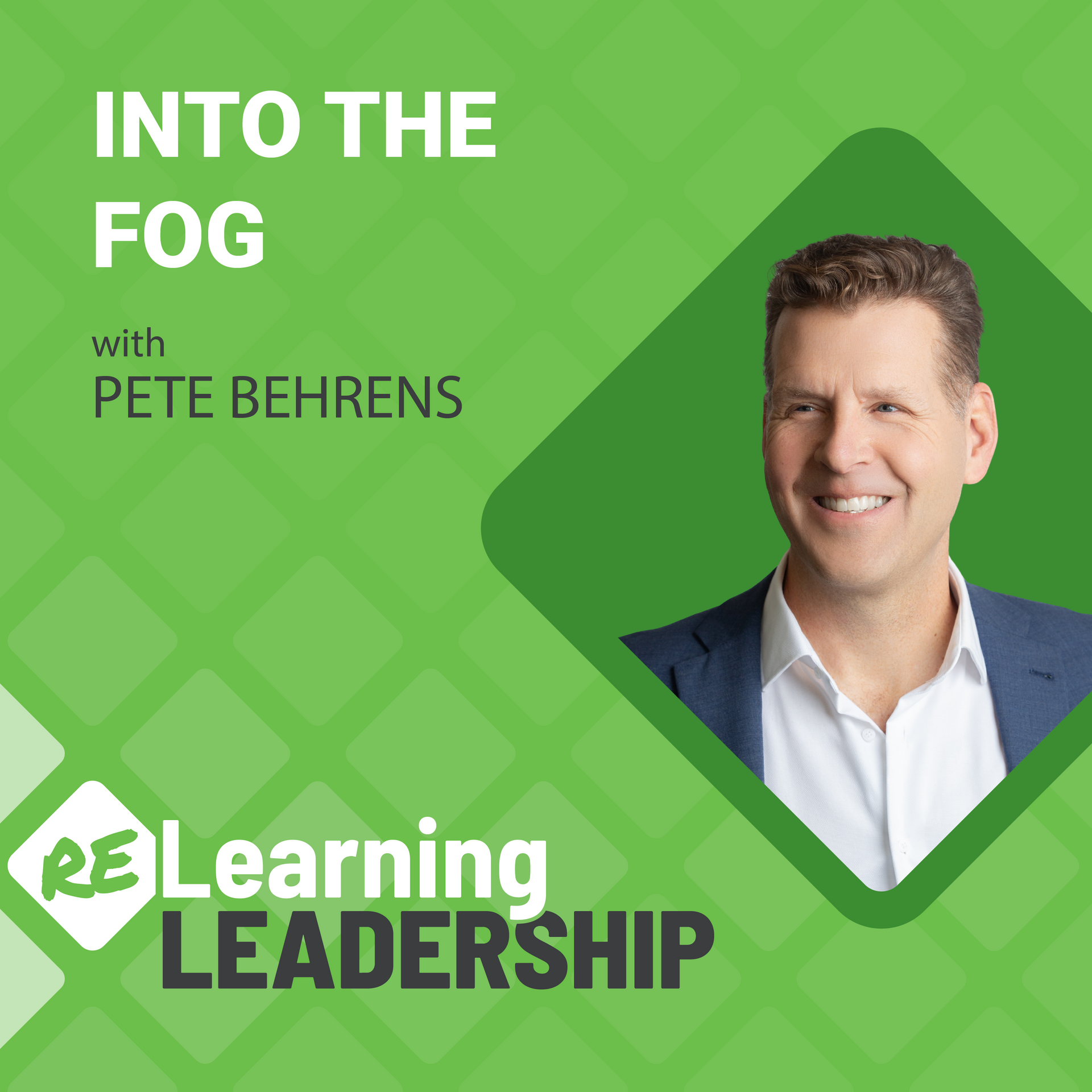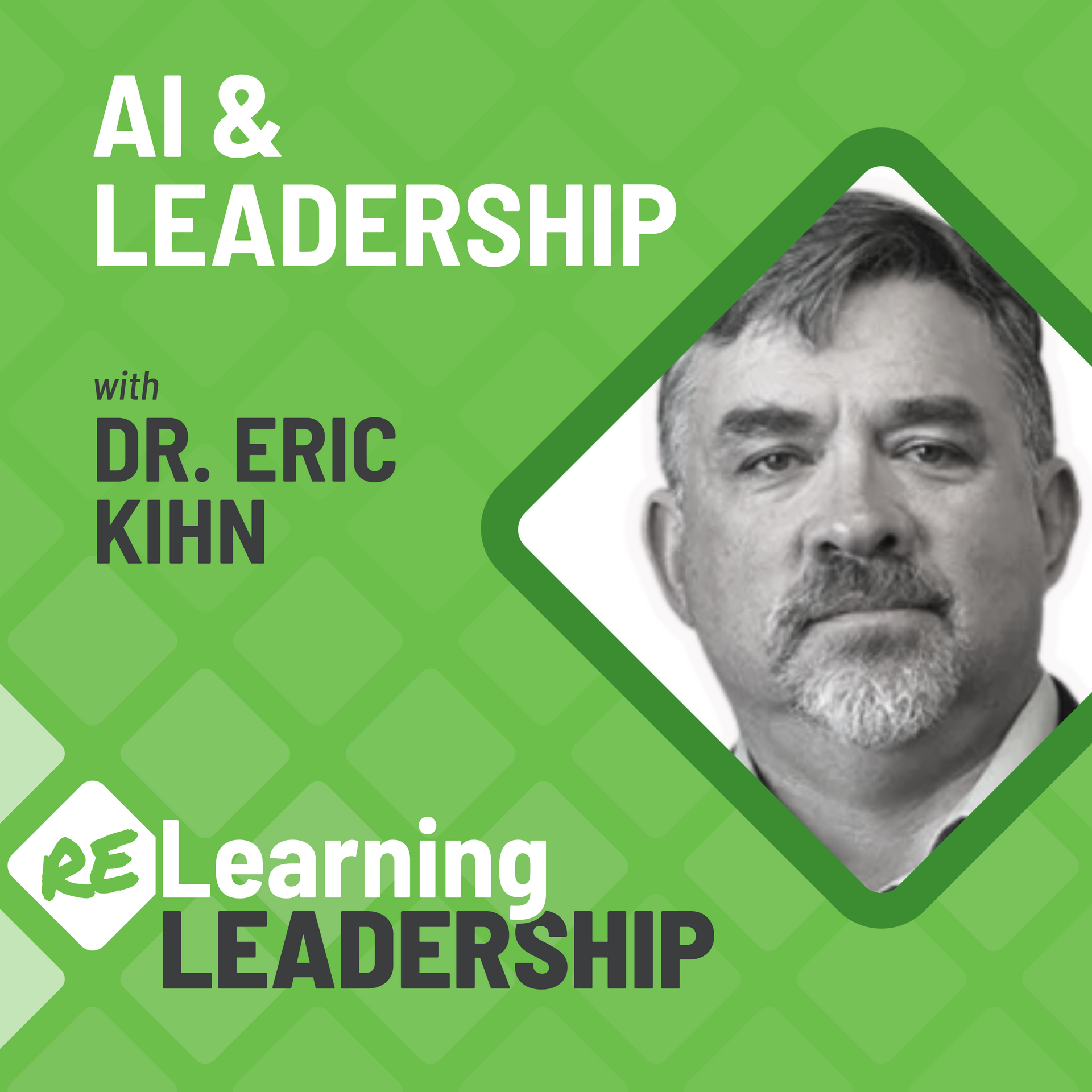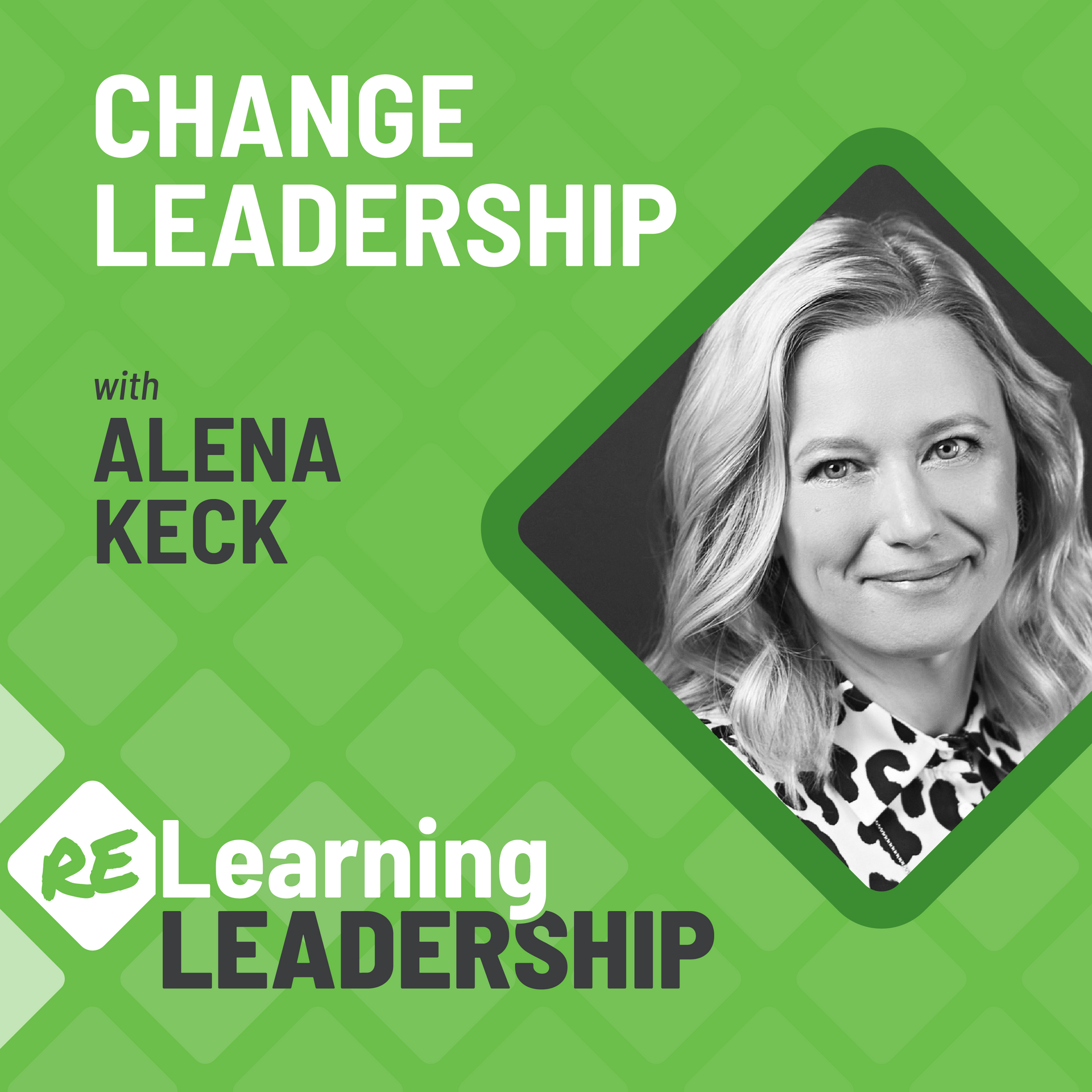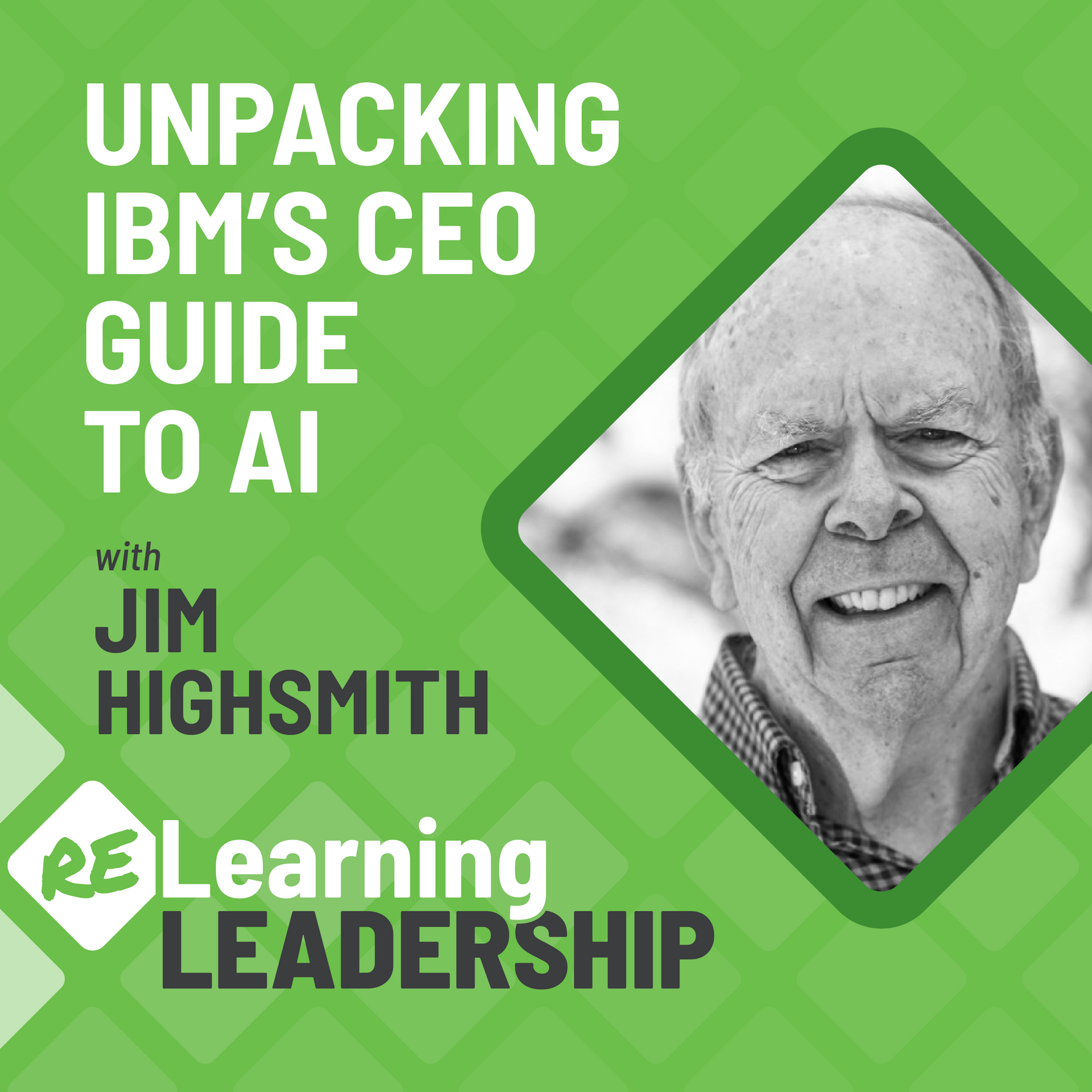3: The Future Leader
Can leadership characteristics be developed?
Jasmine Keel, Head Research & Insights at Swiss Re joins Pete to discuss the mindset and behaviors of the future leader.
Jasmine and Pete explore what the research says behind which leadership traits drive success in today’s global disruptive economy and the emotional and behavior derailleurs which limit it.
Jasmine Keel, Head of Research and Insights at Swiss Re
Swiss Re is one of the world's leading providers of reinsurance and insurance. In her current role, Jasmine takes a research and evidence-based approach to advance group-wide initiatives related to business transformation, culture change and people engagement.
She is also an Executive Coach and Leadership Consultant, and designs leadership development programs for Swiss Re top 200 leaders. One of her research areas is "Leadership in Turbulent Times" to understand better what some leaders do differently that make people thrive in an environment marked by intense workplace pressure and unrelenting change.
Her personal values are: Learning, Contribution, Achievement, Creativity and Zest. In her spare time, she enjoys trying out new hobbies, jogging, practicing yoga and traveling with her husband and three children.
Connect with Jasmine
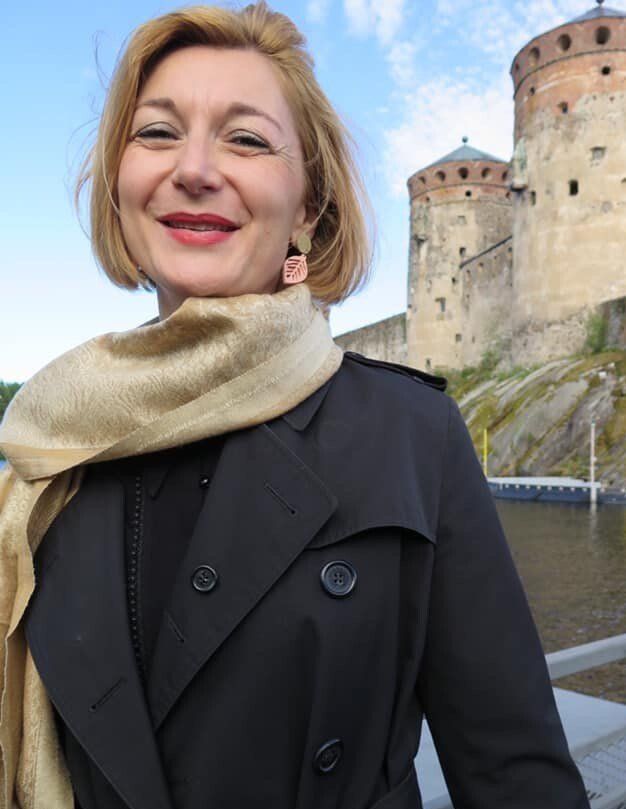
(Re)Learning from Jasmine's Insights...
Jasmine and Pete explore the characteristics that leaders need to exhibit to be considered for future leadership positions and how leaders can develop these characteristics today.
A Clear, Centered Personal Purpose
It is not enough to identify a vision and purpose for an organization once you have the position of leader. Leaders being considered for tomorrow’s top leadership positions are selected because they have already developed a vision and purpose for themself. Like the eye of a storm, leaders with a strong centered personal vision and purpose are able to more calmly operate in the turbulent environments organizations are thrust into every day.
Learning Agility
Beyond skills and competencies, tomorrow’s leaders require a situational adaptiveness to effectively lead through the fog of complexity and uncertainty. To build this adaptive muscle, leaders must place themselves in challenging “heat experiences” that force them to stretch and explore approaches that are new and uncomfortable; similar to building real muscle in a weight room by pushing your muscles past their capacity. However, heat experiences alone are not enough. Leaders must wrap these experiences with a purposeful reflective cycle to explore, learn and grow from them beyond simply experiencing them.
Human Connectedness
There's been a fundamental shift happening in the world of work when it comes to connection. A July 2020 study by Adecco indicates that 74% of employees want their managers to demonstrate a leadership style focused on empathy and a supportive attitude. This new social contract expectation between employees and leaders is increasingly necessary in a globally disconnected world where digital connection is the norm. Empathy, trust and a new focus on wellbeing and culture building are the most important leadership skills. Tomorrow’s leaders must demonstrate competency in the human side of organizational leadership.
Managing Emotional and Behavioral Derailers
The International Institute for Management Development has identified eight key emotional and behavioral derailers that trip up senior leaders. Most senior leaders exhibit 1 to 3 of these if they have not explicitly worked to manage them over time. And regardless of other positive characteristics, leaders will not likely be effective at more senior leadership positions without addressing them.
- Arrogance: You are right and everyone is wrong.
- Charisma Complex: You always grab the center of attention.
- Habitual Distrust: You focus on the negatives.
- Aloofness: You disengage and disconnect.
- Volatility: Your mood swings drive business swings.
- Excessive Caution: The next decision you make may be your first.
- Perfectionism: Get the little things right even if the big things go wrong.
- Eagerness to Please: Winning the popularity contest matters most.
Episode Transcript
Pete Behrens:
What does the future leader look like and what can we do today to become one? Welcome to another episode of Relearning Leadership, where we explore a specific leadership challenge and break it down to help improve your leadership, your organization, and even your personal life. Today, I'm joined by Jasmine Keel, the Head of Research and Insights in Human Resources at Swiss Re, one of the top global insurance and reinsurance companies based in Zurich, Switzerland. Together, Jasmine and I explore the future of leadership and what leaders can do today to be one.
Jasmine Keel:
To be the future leader, you don't need to be this dynamic, charismatic, super cool leader. No, you need a clear, quiet vision and really an understanding of why you get out of your bed and why other people should follow you.
Pete Behrens:
Following our discussion, join me as I summarize key insights from what I relearned about leadership. I'm your host, Pete Behrens, Founder of the Agile Leadership Journey and 30-year veteran in corporate leadership, both as a leader myself and in guiding other leaders. And as an engineer by profession, I now help leaders optimize their people systems to become more focused, responsive, and resilient to change. Let's dive in.
Well welcome to the show, Jasmine.
Jasmine Keel:
Thanks for having me, Pete.
Pete Behrens:
Well, it's great to have you here. And some of you are wondering maybe who is Jasmine Keel? Well, let me embarrass her just a little bit because I know her humble spirit would not show this. But just to highlight her education background, she has a graduate degree in economics and finance, a master's degree in strategy, a management and accounting degree. Now the interesting part comes in, she's also a certified professional coach, an organization and relation systems coach, ORSC, for those out in the coaching field. And she has an executive master's degree in positive leadership and strategy. And with all that, what I'm most interested in is her role today is as Head of Research and Insights for Human Resources at Swiss Re, one of the world's leading insurance and re-insurance companies based in Zurich, Switzerland. And Jasmine, I can imagine you've likely forgotten more than most of us have even learned.
Jasmine Keel:
Thanks, Pete. You're very generous.
Pete Behrens:
So, let's dive into maybe just the research you're doing today. Do you mind just sharing the focus of your research and how you're finding that to be a useful at Swiss Re?
Jasmine Keel:
Maybe it's helpful for everyone to know that I have two kind of roles. One is I'm an executive leadership development consultant, supporting our top 200 leaders at Swiss Re, a company that's approximately 15,000 employees. And I'm also the Head of Research and Insights, really trying to stay in touch with the latest trends and best practices out there. So, in the context of COVID-19, the research has been very much focusing on what kind of profiles are we looking for when it comes to senior leaders, even C-level talent. In light of all the challenges that we face right now, what's our aspiration. And then working backwards, what does it mean for leadership development? What does it mean? Is something different? There's always all those leadership books about redefining leadership, but what really, really, has anything changed or not? And if I had to give a spoiler, I would say, yes, something has changed.
Pete Behrens:
I like the spoiler. Awesome. And I think whether or not somebody is destined for that C-level, I think what's interesting to me is knowing what that path looks like and what leaders at any level can be looking to. Because my guess is a lot of these skills or competencies, or mindsets are probably transferable up and down the chain. Is that fair to say, or are there differences that are coming out for those more senior leaders?
Jasmine Keel:
I think what has fundamentally changed is most probably 15 years ago on a similar podcast, Pete, that you would have been hosting, the person would have said, "Okay, you need this skill or this competency, like risk management or cost efficiency. And you really need to work on your communication style to look charismatic, et cetera." But today the challenge is really, I use somebody who can lead with increased complexity and certainty. Can you find the answers even if they are not available? Can you deal? If you just think of COVID-19, Pete. Okay, so our leaders, they had to move the business forward. They had to adapt to new technology. They had to keep motivating the employees and they had to juggle with all of life. You would never get equipped for that. So, are you in the moment, able to not only cope with the situation, but really embrace those challenges? This is the key differentiator.
Pete Behrens:
So due to the increasing complexity and uncertainty, it sounds your measures of effective leadership have shifted in a sense from competency in a particular skill to resiliency and adaptiveness of those skills in real time. And maybe from being smart at something to being responsive to something. I think that's an interesting space because a lot of people are saying COVID is an anomaly, this is somehow different. And while I agree, it's definitely extreme, I look at COVID as more like a data point on a trend of disruption. And so, I'm curious what your research is saying about this and is resiliency and adaptiveness something that can be developed or is it simply an inherent trait people have, or they don't?
Jasmine Keel:
Yeah. And I'm just smiling when I hear you, because somebody was saying to me that COVID-19 has been the biggest leadership assessment ever. <laugh> Don’t run separate assessments, <laugh> you've got it all <laugh>. So one thing, and I fundamentally believe in that and other famous people said it, you're not born a leader. You develop as a leader. And let me just use a metaphor about how you develop those leadership, new competencies. I love the metaphor of the glass. So, imagine a cup. In your cup, do you add more content? And some content is good, like digital skills and digital transformation and AI machine learning, you want that. But what are you doing in your personal development journey to also increase the size of the cup so that you can take more?
Jasmine Keel:
And so let me just be a little bit more specific. What you want to do in your career is not to go for the easy jobs. You want to put yourself into walls, that when you have to drive change and transformation. You want to put yourself into walls where you have to work in teams and work with others and where the performance is going to be the sum of everybody being able to come together. You want to still stay grounded. And it's something I'd love to elaborate on because one of the things that came out of the study is that to be the future leader, you don't need to be this dynamic, charismatic super-cool leader. No, you need a clear, quiet vision and really an understanding of why you get out of your bed and why other people should follow you.
Pete Behrens:
There's a lot to maybe unpack in that. Maybe let me just start with this concept of increasing the cup and that's a great metaphor, I think. Rather than throwing skills into the cup, it's what is my capacity as a leader? What is my capability and influence as a leader? And so, what it sounds like is experience is one key aspect of that. Putting yourself in stressful or putting yourself in challenging situations.
Jasmine Keel:
Heat experiences, yes.
Pete Behrens:
Heat experiences. I like that. But one of the things that I know also is experience alone probably isn't enough. And so, I'm wondering how do you compliment that, right? Because one thing is to develop those muscles and put yourself in those work, I think about it like a workout, like I'm going to go stress some of these muscles and work them out to grow the muscle. But my guess is there's probably some education about how to do that effective or how we learn from that. Do you complement that in any way?
Jasmine Keel:
We've been looking at why some CEOs fail. I just want to tie it with that. How does it come that some CEOs really are not being successful? And usually, it's got nothing to do with competency, it's got to do with character and a lack of self-reflection. And so nowadays, more than ever, you want to have this self-awareness capacity, and we flagged. I was talking to a friend at the UNDP, she's full of energy, she's amazing. And she was saying to me, every day, she asks herself three questions. “How was I supporting other people today? When was I at my best? And what did I learn about myself as a leader?” And those are not huge elements. We have a program that's called a Pathfinder, at Swiss Re, and we make them, on the first day, share their stories of leadership, what have been the key challenges and principles. But the rest of the time, it's really to extract the learnings out of that, and it doesn't happen if you don't do it.
Pete Behrens:
So, what I'm painting a picture of in my head here is, all right, I've got to put myself in these heat moments, these moments that are going to stress me, in a sense challenge me, that are beyond maybe my comfort zone. But if I don't do that with some intent, if I don't do that with some purpose, some reflective capacity to use that moment as I would even say like, "Okay, what's my hypotheses? What's my reflection? What I'm doing here? How am I learning from this?" It sounds like what you're saying here is there is some purpose to what I'm doing and using that in a very intent-full way. Is that a fair characteristic of what you're illustrating here?
Jasmine Keel:
Yeah. Absolutely. And I would call that learning agility. Yeah, I think every single company nowadays is assessing future leaders based on that kind of thinking, and if you were keen to join Swiss Re, you would have the privilege to take this assessment learning agility, because we really think this is key. And this is the ability and willingness to learn from experience, and then apply that learning to perform successfully in new situations. This has got nothing to do with geographical region. It's got to do with, are you constantly optimizing at your best? Are you processing the new and being able to apply into tomorrow's challenges?
Pete Behrens:
So, what I love about that, and I would love to work with you to make that more public and see if there's a way we can provide a tool to our leaders here to test, assess their learning agility because in a sense, I love the concept you're doing here. It's like, all right, it's not the skill, it's not the competency, it's the ability to acquire skills. It's the ability to adapt, it's the ability to, in a sense connect and operate. I noticed in your description before about the three questions, “how was I supporting others today?” was in that list. So, my guess is there's also a sense in here of a leader is not alone in this path. What is your research saying about that side of it, about the connection or just the working with others in this world?
Jasmine Keel:
Yeah. And you notice, there's been some fundamental shifts happening in the world of work when it comes to connection. You can also call it maybe emotional intelligence or simply empathy. And that relates also to the evolving employees' expectations. So, I was just reading a study from Adecco, conducted among 8,000 office workers globally. And let me read you that. “74% of employees want their managers to demonstrate a leadership style focused on empathy and a supportive attitude.” Some people even call it the new social contract, which is great because people want to be able to contribute to support. And that fits exactly with what we were saying, Pete.
Pete Behrens:
So Jasmine, you're talking about the social contract, and I think this is a really interesting connection, especially for our first line, second line managers who are so close to the employee, and we hear a lot of times employees leave because of that relationship if that's a problem. I'm wondering, does that change, that social contract change in any way, as a leader moves into these more senior positions?
Jasmine Keel:
Yeah, definitely. And for that, let me be very specific because we've been looking at like a one pager with C-level profiles. And why do we want to see that? So obviously, there is the experience, that's fantastic. But what you have here is also the emotional intelligence. And then the third thing that is also a little bit new, it's the digital readiness topic. And I just want to share some anecdotes on the need that this connection, human-centric approach, is lived at all levels. So as part of this research, I was asking, "How do you assess people? How do you know if they have actually EQ?" And a few colleagues from other companies were saying interviews. We call the wife, we call the neighbors, we call the previous employees because we want to not just have a little checklist, we want to know if this is really valid.
Jasmine Keel:
The other thing that is part now of those senior leaders' assessments, it's often your emotional and behavior will derail us. Let me just elaborate a little bit, because often, if you are unsuccessful in a job, it's not really about competence issues. And we looked at all the failed CEOs, the failures of CEOs, it's more about personality problems. And there are eight derailers that if you don't manage at the very early stages of your career, you will never go to the top. Even if you have driven change and transformation, even if you have spent a few times in Asia for some other experience, even if you have had client facing experiences and all the kind of experiences. And of those eight emotional derailers, like the dark side of personality, the shadows, one is arrogance, you're right and everybody else is wrong. And we note as leaders, they're really competent, but then never really make it to the top because this is a blocker. And another one is when they call in the technical word, aloofness. You disengage and disconnect.
Pete Behrens:
It's interesting, you're talking and it's intriguing. I can imagine a lot of people out there, "What are the eight? What are the eight? I want to know. I need to know them." And I think what I'm going to do is tease our audience here with a little bit of, hey, we'll put that in our notes a little bit later, if you want the rest of the ones here. And I remember reading an article recently where it's like employees want a narcissist who's humble. And I thought that because there's this intersection between you want somebody who's passionate, has the attraction of people, but in a way that isn't overwhelming, like this arrogance and aloofness that you're referring to, I think. And what I find fascinating with a lot of these studies is it's that balance.
Pete Behrens:
And that balance in terms of confidence and empathy or humbleness or vulnerability, it's the intersection between, has a strength and is able to be open to other inputs. And I'm curious, in terms of these eight emotional derailers, it sounds like what you're saying is, as good as you are on the positive side, if any of these negatives come through, that is essentially a spotlight or this challenge.
Jasmine Keel:
Yes. And let me slightly reframe what you say, if I may say Pete.
Pete Behrens:
Please.
Jasmine Keel:
Please do not look for narcissistic and humble leaders. You want to look for confident and humble leaders, and you want to be a confident and a humble leader. And the confidence, because sometimes, in the leadership networks, it's only about EQ and empathy. And that's great, but what we also found out in the research, you want the confidence, is that you want to be confident in your expertise, in your experiences, but also in your vision. And so, I would strongly encourage everyone, even the introverts, to really write down for themselves, "What is my vision?" And just on the anecdote, I do some yoga. And we know as a principle of yoga is that there's a storm and this is a worker, but you want, in the eye of the storm, it's very quiet.
Jasmine Keel:
And again to illustrate, because you might think, "Really?" Well at Swiss Re, at the moment, we take all our senior leaders to a retreat for three days and a half. It's a CEO sponsored program. It's called the Pathfinder. It's to reflect on your key leadership challenges, like those heat experiences. But it's also to refine your personal purpose. And even if everything gets shaky, what is it that you want to achieve? And it's something we haven't talked so much yet, Pete. Maybe I'm jumping on another topic. Another thing that came out very strongly is leaders are being asked to take social stances on very sensitive topics. And this ethical compass is more and more needed. And you see even the president or CEO of Microsoft making announcements, statements on Twitter and LinkedIn, and we want those leaders, people who are born to shape the society in the direction we want to see it.
Pete Behrens:
Yeah, it's an interesting off ramp, I think in terms of a topic about social positions that companies and certainly the senior leaders take, especially the CEOs. Jasmine, what I'm getting from this, and maybe just to summarize her a little bit, what I'm hearing from you is leaders are looked to, to have a center of gravity, a clear sense of self, a self-purpose, a self-direction, passion. But there's also what you're looking for is this learning agility, this ability, this lifelong skill of reflection and growth, and that curious, curious mindset. I'm curious, if you have advice for our leaders out there, what would you tell them to help with this, or anything you would help them start to move along in this direction?
Jasmine Keel:
Yeah. So Pete, maybe you know that I have an 18 year old daughter. So, when I hear your question, it's not just like the textbooks and what I would write on a LinkedIn lovely posting, but what I would say to my daughter at the dinner table. And I would say to her most probably three things. I would say to her, connect as many experiences as you can, and go for the experiences that make you be uncomfortable, because this is where the stretch is going to be. Two, do not lose your personal vision on the path, because this is what's going to ground you and come up as an authentic leader who stands for something and for some values. But three, I would say, strengthen your networks, within your current wall or beyond, have those powering partners bring this outside in perspective, because if you don't know, other people might guide you and coach you or mentor you.
Pete Behrens:
Well, Jasmine, I think that is an excellent summary and I can't add more to it, so I'm going to leave it right there. I want to thank you for your time today and your expertise and your wisdom. And thank you for sharing that with us today.
Jasmine Keel:
Thanks Pete. It was my pleasure.
Pete Behrens:
Wow, what an awesome dialogue. I feel blessed to engage with people like Jasmine in the field of leadership. Let me review what I'm going to hold on to from this episode. The first for me is a clear, centered personal purpose. Tomorrow's leaders are not only looked to, to build an organizational vision, they need to come to the position with a clear, centered, personal vision, to be the calm in the eye of the storm.
The second for me was learning agility. Tomorrow's leaders need to shift from building skills to building a learning muscle. Challenge yourself through heat moments with purpose and reflection. Third is human connectedness. Tomorrow's leaders need to design a new social contract with employees where empathy, trust, and a focus on well-being are most important. And finally, manage your emotional derailers. Tomorrow's leaders can only get so far on positive characteristics. Without managing the emotional derailers, you may have already hit your leadership ceiling.
So visit our website,
relearningleadership.show, where we post all episodes, key takeaways, guest profiles, and in this case, yes, all eight emotional derailers for you to peruse. Relearning Leadership is the official podcast of the Agile Leadership Journey. It's hosted by me, Pete Behrens with analysis from our global guide community. It's produced by Gabe Gerzon and David Riemer, with Matter Communications. Art designed by Nicole Bedard. Music by Joy Zimmerman with editing by Ryan Dugan. If you love listening to this podcast, please leave us a review. And to relearn more about your own leadership, visit us at
agileleadershipjourney.com.
Explore:
Recent Episodes

